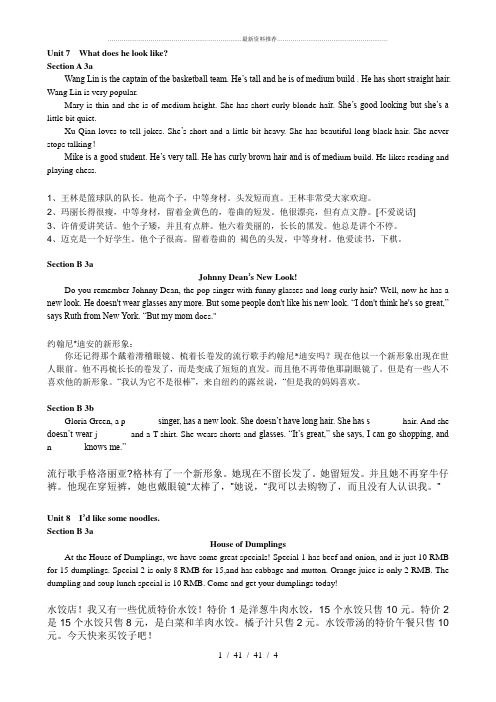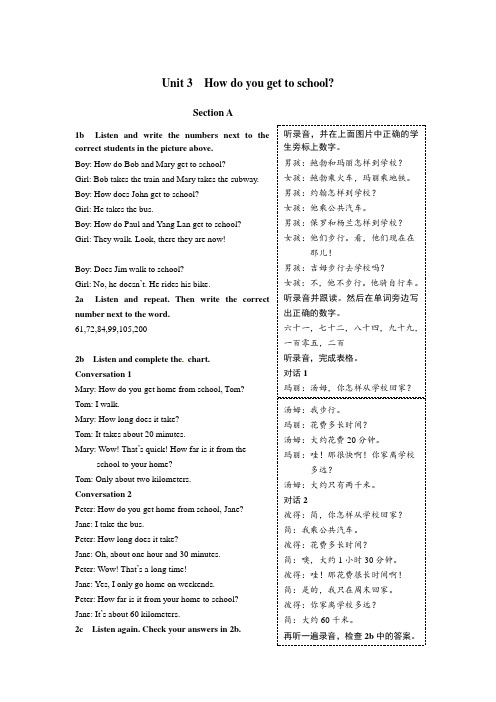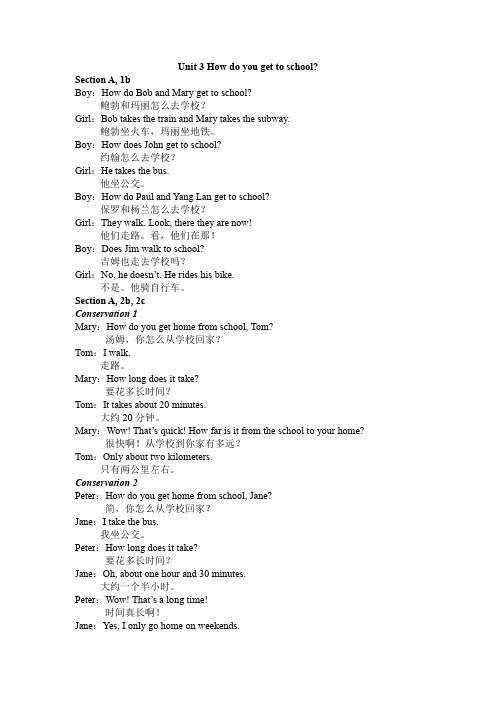七年级英语下册(新目标)Unit3教材听力原文及译文
七年级英语下册教材听力录音及原文译文外研版

新目标英语七年级下册3a课文翻译(带原文)

Unit 7 What does he look like?Section A 3aWang Lin is the captain of the basketball team. He’s tall and he is of medium build . He has short straight hair. Wang Lin is very popular.Mary is thin and she is of medium height. She has short curly blonde ha ir. She’s good-looking but she’s a little bit quiet.Xu Qian loves to tell jokes. She’s short and a little bit heavy. She has beautiful long black hair. She never stops talking!Mike is a good student. He’s very tall. He has curly brown hair and is of med ium build. He likes reading and playing chess.1、王林是篮球队的队长。
他高个子,中等身材。
头发短而直。
王林非常受大家欢迎。
2、玛丽长得很瘦,中等身材,留着金黄色的,卷曲的短发。
他很漂亮,但有点文静。
[不爱说话]3、许倩爱讲笑话。
他个子矮,并且有点胖。
他六着美丽的,长长的黑发。
他总是讲个不停。
4、迈克是一个好学生。
他个子很高。
留着卷曲的褐色的头发,中等身材。
他爱读书,下棋。
Section B 3aJohnny Dean’s New Look!Do you remember Johnny Dean, the pop singer with funny glasses and long curly hair? Well, now he has a new look. He doesn't wear glasses any more. But some people don't like his new look. “I don't think he's so great,” says Ruth from New York. “But my mom d oes."约翰尼*迪安的新形象:你还记得那个戴着滑稽眼镜、梳着长卷发的流行歌手约翰尼*迪安吗?现在他以一个新形象出现在世人眼前。
人教版七年级下册英语 教学资源包 Unit 3 教材听力原文及译文

Unit 3 How do you get to school?Section A1b Listen and write the numbers next to the correct students in the picture above.Boy: How do Bob and Mary get to school?Girl: Bob takes the train and Mary takes the subway. Boy: How does John get to school?Girl: He takes the bus.Boy: How do Paul and Yang Lan get to school?Girl: They walk. Look, there they are now!Boy: Does Jim walk to school?Girl: No, he doesn’t. He rides his bike.2a Listen and repeat. Then write the correct number next to the word.61,72,84,99,105,2002b Listen and complete the chart. Conversation 1Mary: How do you get home from school, Tom? Tom: I walk.Mary: How long does it take?Tom: It takes about 20 minutes.Mary: Wow! That’s quick! How far is it from the school to your home?Tom: Only about two kilometers.Conversation 2Peter: How do you get home from school, Jane? Jane: I take the bus.Peter: How long does it take?Jane: Oh, about one hour and 30 minutes.Peter: Wow! That’s a long time!Jane: Yes, I only go home on weekends.Peter: How far is it from your home to school? Jane: It’s about 60 kilometers.2c Listen again. Check your answers in 2b. 听录音,并在上面图片中正确的学生旁标上数字。
人教版英语七年级下册Unit 3听力原文及翻译

Unit 3 How do you get to school?Section A, 1bBoy:How do Bob and Mary get to school?鲍勃和玛丽怎么去学校?Girl:Bob takes the train and Mary takes the subway.鲍勃坐火车,玛丽坐地铁。
Boy:How does John get to school?约翰怎么去学校?Girl:He takes the bus.他坐公交。
Boy:How do Paul and Yang Lan get to school?保罗和杨兰怎么去学校?Girl:They walk. Look, there they are now!他们走路。
看,他们在那!Boy:Does Jim walk to school?吉姆也走去学校吗?Girl:No, he doesn’t. He rides his bike.不是。
他骑自行车。
Section A, 2b, 2cConservation 1Mary:How do you get home from school, Tom?汤姆,你怎么从学校回家?Tom:I walk.走路。
Mary:How long does it take?要花多长时间?Tom:It takes about 20 minutes.大约20分钟。
Mary:Wow! That’s quick! How far is it from the school to your home?很快啊!从学校到你家有多远?Tom:Only about two kilometers.只有两公里左右。
Conservation 2Peter:How do you get home from school, Jane?简,你怎么从学校回家?Jane:I take the bus.我坐公交。
Peter:How long does it take?要花多长时间?Jane:Oh, about one hour and 30 minutes.大约一个半小时。
人教版七年级下册英语课本听力材料Unit 3

人教版七年级下册英语课本听力材料Unit 3Section A1bHow do Bob and Mary get to school?Bob takes the the train and Mary takes the subway.How does John get to school?He takes the bus.How does Paul and Yang Lan get to school?They walk. Look, there they are now!Does Jim walk to school?No, he doesn’t. He rides his bike.鲍勃和玛丽怎么去学校?鲍勃乘火车,玛丽乘地铁。
约翰怎么去学校?他坐公共汽车。
保罗和杨澜怎么去学校?他们走路。
看,他们现在在那儿!吉姆走路去上学吗?不,他不骑。
他骑自行车。
2b/2cConversation 1How do you get home from school, Tom?I walk.How long does it take?It takes about 20 minutes.Wow! That’s quick! How far is it from the school to your home? Only about two kilometers.对话1汤姆,你放学怎么回家?我走路。
需要多长时间?大约需要20分钟。
哇!太快了!从学校到你家有多远?大约只有两公里。
Conversation 2How do you get home from school, Jane?I take the bus.How long does it take?Oh, about one hour and 30 minutes. Wow! That’s a long time!Yes , I only go home on weekends.How far is it from your home to school? It’s about 60 kilometers.对话2简,你怎么从学校回家的?我坐公共汽车。
七年级英语(下)(人教版) 教材听力原文及译文

UNIT 1Section A1b Listen and number the conversations [1-3]. Conversation 1Girl: I want to join the music club. Boy: Oh, can you sing? Girl: Yes, I can. Conversation 2 Girl: Can you swim? Boy: No, I can ’t. Conversation 3Girl: I want to join the art club. Boy: Can you draw? Girl: Yes, I can.2a Listen to these two conversations and the clubs you hear. Conversation 1David: What club do you want to join, Lisa? Lisa: I want to join the chess club. David: Can you play chess?Lisa: No, I can ’t. What about you, John? John: I can. Conversation 2Bob: Hi, Mary. Here are all the clubs.Mary: What club do you want to join, Bob?Bob: I want to join the English club. I like to speakEnglish. How about you?Mary: Hmm. I want to join the chess club. Can youplay chess?Bob: No, I don ’t like chess. Do you like music?Mary: Oh, yes. I can sing and dance. I like music.Bob: Me, too. Let ’s join the music club.2b Listen again. Complete the sentences. Conversation 1David: What club do you want to join, Lisa? Lisa: I want to join the chess club. David: Can you play chess?Lisa: No, I can ’t. What about you, John? John: I can.听录音,为对话编号[1-3]。
人教新目标英语七年级下1-6单元课文翻译
人教新目标英语七年级下1-6单元课文翻译第一单元Sectio n A图片你的笔友来自哪?他来自澳大利亚。
你的笔友来自哪?她来自日本。
2d 约翰的笔友来自哪? 他来自日本。
他住在哪?他住在东京。
Gramma r Focus你的笔友来自哪? 他来自澳大利亚。
约翰的笔友来自哪?他来自日本。
他住在哪?他住在巴黎。
3b这是我的新笔友。
她来自澳大利亚。
他讲什么语言? 她讲英语。
4 问题:悉尼在哪儿?答案:在澳大利亚!悉尼在哪儿?在美国。
不,在澳大利亚。
Sectio n B2a她叫什么名字?她来自哪?她有兄弟姐妹吗?她最喜欢的学科是什么?她讲英语吗?她住在那?2c那是你的笔友吗?是的,他(她)是。
3a 亲爱的同学:我的名字叫鲍勃。
我住在加拿大的多伦多。
我想交一个中国笔友。
我为中国是个很有趣的国家。
我14岁,是十一月出生的。
我说英语,还能讲一点法语。
我有一个哥哥叫保罗,还有一个妹妹萨拉。
他们有英国和澳大利亚的笔友。
我喜欢与朋友们一起看电影,做体育运动。
在学校里最喜欢上体育课。
它非常有意思。
但是我不喜欢数学。
他太难了!你能尽快给我回信吗?鲍勃3b 寻找笔友我的名字叫汤姆?金,我十四岁了。
来自澳大利亚。
我讲英语。
我有一个哥哥萨姆,还有一个妹妹莉萨。
我在周末玩足球,他是我最喜欢的运动。
在学校里我喜欢音乐。
他很有趣!我最喜欢的电影是《漫长的周末》。
你知道吗?它是一部动作片。
请写信告诉我有关你的情况。
Self check1加拿大日本从……纽约东京英语法语居住笔友日语语言美国澳大利亚法国英国新加坡Just for fun你从哪里来?火星。
我讲英语和火星语。
第二单元Sectio n A图片这儿附近有银行吗?是的,有。
它在中心大街。
2a 1、投币式公用电话在图书馆对面。
2、投币式公用电话紧挨着图书馆。
七年级下unit 3单词音标和课文
unit 3A blind man and his “eyes” in a fire“ Good evening, sir.” said the receptionist. “ You’re welcome to stay, but I’m sorry that we don’t allow pets here.”“ Charlie isn’t a pet, “ said John. “ He’s my eyes. I’m blind and I can’t go anywhere by myself.”The receptionist apologized and led John and Charlie to their room.John was very tired. He soon fell asleep. Some time later, Charlie started barking. John woke up and smelt smoke. A fire! Smoke started to come in from under the door. With Charlie’s help, John put some wet towels along the bottom of the door. Then he got down on the floor next to Charlie and waited.Soon he heard the sound of a fire engine. A fireman arrived and got him out of the building, but the fireman did not want to take Charlie. John would not go without his “eyes”. Finally, the fireman got Charlie out of the building too and they were both safe.“晚上好先生”那个接待员说, “欢迎您来入住,但是我们不允许带宠物来这里。
新版新目标英语七年级下册课文及翻译
Bob: No, I don't Iike chess. DO you Iike music?
不,我不喜欢国际象棋。你喜欢音乐吗?
Mary: Oh, yes. I CanSing and dance. I Iike music.
哦,是的。我会唱歌跳舞。我喜欢音乐。
Jane: Great! What SPOrtS Can you play?太好了!你会什么运动?
Bob: Soccer.足球。
Jane: SO you CarI join the SOCCer ClUb.那你可以参加足球俱乐部。
Bob: What about you? You" r^ery good at StOry
Bob: Me, too. Let,s join the music club.我也是。让我们参加音乐俱乐部吧。
2d
Jane: Hi, Bob. What ClUb do you Want to join?你好,鲍勃。你想参加什么俱乐部?
Bob: I Want to join a SPOrtS club.我想参加一个体育俱乐部
俱乐部,讲故事俱乐部和美术俱乐部!
Jane: OK, Iet ' Sjoinn!o好,我们现在就去参加!
SeCtiOn B—*1d&*Ie( P4)
TeaChen I Want SOme StUdents for the SChOOl Concert. What Can you do, Bill? Can you sing?我想找些学生参加学校的音乐会。你会做什么,比尔?你会唱歌吗?
Bob: I Want to join the English club. I Iike to SPeak English. HOW about you?
(完整版)七年级英语下册(新目标)Unit3教材听力原文及译文
Unit 3 How do you get to school?Section A1b Listen and write the numbers next to the correct students in the picture above.Boy: How do Bob and Mary get to school?Girl: Bob takes the train and Mary takes the subway. Boy: How does John get to school?Girl: He takes the bus.Boy: How do Paul and Yang Lan get to school?Girl: They walk. Look, there they are now!Boy: Does Jim walk to school?Girl: No, he doesn’t. He rides his bike.2a Listen and repeat. Then write the correct number next to the word.61,72,84,99,105,2002b Listen and complete the chart. Conversation 1Mary: How do you get home from school, Tom? Tom: I walk.Mary: How long does it take?Tom: It takes about 20 minutes.Mary: Wow! That’s quick! How far is it from the school to your home?Tom: Only about two kilometers.Conversation 2Peter: How do you get home from school, Jane? Jane: I take the bus.Peter: How long does it take?Jane: Oh, about one hour and 30 minutes.Peter: Wow! That’s a long time!Jane: Yes, I only go home on weekends.Peter: How far is it from your home to school? Jane: It’s about 60 kilometers.2c Listen again. Check your answers in 2b. 听录音,并在上面图片中正确的学生旁标上数字。
- 1、下载文档前请自行甄别文档内容的完整性,平台不提供额外的编辑、内容补充、找答案等附加服务。
- 2、"仅部分预览"的文档,不可在线预览部分如存在完整性等问题,可反馈申请退款(可完整预览的文档不适用该条件!)。
- 3、如文档侵犯您的权益,请联系客服反馈,我们会尽快为您处理(人工客服工作时间:9:00-18:30)。
school to your home? Tom: Only about two kilometers. Conversation 2
Peter: How do you get home from school, Jane? Jane: I take the bus. Peter: How long does it take? Jane: Oh, about one hour and 30 minutes.
from the train station to their home. Mary: Wow. That ’s a long trip.
玛丽:花多长时间? 鲍勃:花大约六个小时。然后我从
火车站乘公共汽车去他们家。 玛丽:哇,那是一段很长的旅程。 再听一遍录音。鲍勃怎样到他祖父 母家 ?在 1 或 2 前打 “√”。 玛丽:鲍勃,我喜欢你的家。它真大啊! 鲍勃:谢谢,玛丽。我外祖父母家
big, too. Mary: Where do they live? Bob: Very far from my home. Mary: Oh, how far? Bob: It ’s about 500 kilometers from here. Mary: Wow! That ’s far. Bob: Yes, it is. So I go there and see my grandparents
也很大。 玛丽:他们住在哪儿? 鲍勃:离我家很远。 玛丽:哦,多远? 鲍勃:离这儿大约 500 千米。 玛丽:哇!那很远。 鲍勃:是的,所以每年我去那儿看
我外祖父母仅一两次。 玛丽:你怎样去那儿? 鲍勃:我通常乘火车。 玛丽:花多长时间? 鲍勃:花大约六个小时。然后我从
火车站乘公共汽车去他们家。 玛丽:哇,那是一段很长的旅程。
我外祖父母仅一两次。 玛丽:你怎样去那儿?
Mary: How long does it take? Bob: It takes about six hours. And then I take a bus
from the train station to their home. Mary: Wow. That ’s a long trip.
Conversation 1 Mary: How do you get home from school, Tom? Tom: I walk. Mary: How long does it take? Tom: It takes about 20 minutes. Mary: Wow! That ’s quick! How far is it from the
school to your home? Tom: Only about two kilometers. Conversation 2 Peter: How do you get home from school, Jane? Jane: I take the bus. Peter: How long does it take? Jane: Oh, about one hour and 30 minutes. Peter: Wow! That ’s a long time! Jane: Yes, I only go home on weekends. Peter: How far is it from your home to school? Jane: It’s about 60 kilometers. 2c Listen again. Check your answers in 2b.
Peter: Wow! That ’s a long time! Jane: Yes, I only go home on weekends. Peter: How far is it from your home to school? Jane: It’s about 60 kilometers.
火车站乘公共汽车去他们家。 玛丽:哇,那是一段很长的旅程。
Section B
1c Listen and check (√) the things that Mary wants to know. Mary: I love your home, Bob. It ’s so big! Bob: Thanks, Mary. My grandparents ’home is very
1d Listen again. How does Bob get to his grandparents h’ome?Check (√) 1 or 2. Mary: I love your home, Bob. It ’s so big! Bob: Thanks, Mary. My grandparents ’home is very
big, too. Mary: Where do they live? Bob: Very far from my home. Mary: Oh, how far? Bob: It ’s about 500 kilometers from here. Mary: Wow! That ’s far. Bob: Yes, it is. So I go there and see my grandparents
only one or two times a year. Mary: How do you get there? Bob: I usually take the train. Mary: How long does it take? Bob: It takes about six hours. And then I take a bus
对话 1 玛丽:汤姆,你怎样从学校回家? 汤姆:我步行。 玛丽:花费多长时间? 汤姆:大约花费 20 分钟。 玛丽:哇!那很快啊!你家离学校
多远? 汤姆:大约只有两千米。 对话 2 彼得:简,你怎样从学校回家? 简:我乘公共汽车。 彼得:花费多长时间? 简:噢,大约 1 小时 30 分钟。 彼得:哇!那花费很长时间啊! 简:是的,我只在周末回家。 彼得:你家离学校多远? 简:大约 60 千米。 鲍勃:我通常乘火车。 玛丽:花多长时间? 鲍勃:花大约六个小时。然后我从
听录音,并在上面图片中正确的学 生旁标上数字。 男孩:鲍勃和玛丽怎样到学校? 女孩:鲍勃乘火车,玛丽乘地铁。 男孩:约翰怎样到学校? 女孩:他乘公共汽车。 男孩:保罗和杨兰怎样到学校? 女孩:他们步行。看,他们现在在
那儿! 男孩:吉姆步行去学校吗? 女孩:不,他不步行。他骑自行车。 听录音并跟读。然后在单词旁边写 出正确的数字。 六十一,七十二,八十四,九十九, 一百零五,二百 听录音,完成表格。 对话 1 玛丽:汤姆,你怎样从学校回家?
only one or two times a year. Mary: How do you get there? Bob: I usually take the train.
听录音,并在玛丽想知道的事情前 打 “√”。
玛丽:鲍勃,我喜欢你的家。它真大啊!
鲍勃:谢谢,玛丽。我外祖父母家 也很大。
玛丽:他们住在哪儿? 鲍勃:离我家很远。 玛丽:哦,多远? 鲍勃:离这儿大约 500 千米。 玛丽:哇!那很远。 鲍勃:是的,所以每年我去那儿看
汤姆:我步行。 玛丽:花费多长时间? 汤姆:大约花费 20 分钟。 玛丽:哇!那很快啊!你家离学校
多远? 汤姆:大约只有两千米。 对话 2 彼得:简,你怎样从学校回家? 简:我乘公共汽车。 彼得:花费多长时间? 简:噢,大约 1 小时 30 分钟。 彼得:哇!那花费很长时间啊! 简:是的,我只在周末回家。 彼得:你家离学校多远? 简:大约 60 千米。 再听一遍录音,检查 2b 中的答案。
Unit 3 How do you get to schoolwrite the numbers next to the correct students in the picture above. Boy: How do Bob and Mary get to school? Girl: Bob takes the train and Mary takes the subway. Boy: How does John get to school? Girl: He takes the bus. Boy: How do Paul and Yang Lan get to school? Girl: They walk. Look, there they are now!
Boy: Does Jim walk to school? Girl: No, he doesn ’t. He rides his bike. 2a Listen and repeat. Then write the correct number next to the word. 61,72,84,99,105,200
